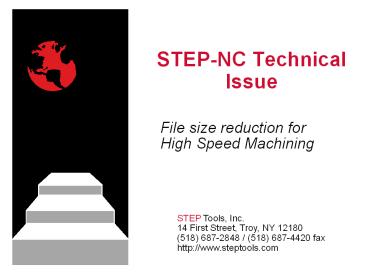STEP-NC%20Technical%20Issue - PowerPoint PPT Presentation
Title:
STEP-NC%20Technical%20Issue
Description:
An additional line segment requires one additional Cartesian point entity in a polyline. ... Start = composite_curve,trim._1. End = composite_curve.trim_2 ... – PowerPoint PPT presentation
Number of Views:22
Avg rating:3.0/5.0
Title: STEP-NC%20Technical%20Issue
1
STEP-NC Technical Issue
File size reduction for High Speed Machining
STEP Tools, Inc. 14 First Street, Troy, NY
12180 (518) 687-2848 / (518) 687-4420
fax http//www.steptools.com
2
Description
- HSM files contain many arcs.
- The STEP-NC representation for arcs is verbose
- An additional line segment requires one
additional Cartesian point entity in a polyline. - An additional arc requires
- A composite curve entity
- A circle entity
- An axis2_placement entity
- 2 direction entities
- 2 Cartesian point entities
- And it has to be repeated for every curve because
of the parameterization rules - Tool axis curve
- Cross section parameter curve
- Feed override curve
3
Analysis
- STEP representation for bounded curve is very
powerful - Allows many types of entities to be included in
the curve - Line, arc, b-spline, curve-on-surface, others
- But legacy machining data today is either
- Millions of line segments traditional data
- Millions of line and arc segments HSM data
- We need a more compressed method for representing
legacy data - Full semantics are not helpful for this data
- STEP Kinematics schema shows how
- Three points define an arc
- Four points (with two coincident) define a
complete circle
4
Proposed Solution
- The STEP schema for kinematics has via-entities.
- The path goes via the given point
- We propose enhancing the representation of tool
path polylines to allow for two types of
via-points - via_arc
- The curve to and from the via is an arc
- via_helix
- The curve to and from the via is a helix arc
5
via_arc
ENTITY via_arc SUBTYPE_OF (cartesian_point)
end
end
ccw arc
via arc
start
start
Bounded Curve Encoding Start composite_curve,tri
m._1 End composite_curve.trim_2 Radius
composite_curve.circle.radius Center
composite_curve.circle.placement.location Sense
composite_curve.sense_agreement Axis
composite_curve.circle.placement
Via Encoding Start polyline0 Via
polyline1 End polyline2 Radius radius
(start, via, end) Center center (start, via,
end) Sense pdistance (sense, start, via) lt
pdistance (sense, via, end) Axis toolpath_axis
Center (a, b, c) computes a circle center from
three distinct points Radius (a, b, c) compute a
circle radius from three distinct
point Pdistance (sense, a, b) is the distance
along the perimeter in the sense direction
6
Special case 1 complete circle
ccw circle
cw circle
via arc 2
via arc 1
via arc 1
via arc 2
start and end
start and end
Via Encoding Start polyline0 Via 1
polyline1 Via 2 polyline2 End
polyline3 Radius distance (center (start, via
1, via 2) Center center (start, via 1, via
2) Sense pdistance (sense, start, via 1)
lt pdistance (sense, via 2, end)
7
Special case 2 - Helix
ENTITY via_helix SUBTYPE_OF (cartesian_point)
- A via helix is an arc or complete circle where
the z coordinate increases or decreases. - The increasing or decreasing z coordinate is in
the coordinate system defined by the axis of the
arc/circle. - If there is more than one via_helix point then
the z coordinate of each must be on the helix
8
Rules
- The first and last points of a polyline cannot be
vias. - If two consecutive points are vias then they
must be of the same type (arc or helix) and be on
the same arc - A via cannot have the same coordinates as the
preceding or following point. - It is illegal for a single via to separate two
regular points that are coincident.
9
Measurements
- Measurements made for Bordeaux_20080116.238
- A high speed machining file for the fish head
- Contains part geometry, tolerances and tool paths
- Using Bounded Curve encoding
- 1,938 K bytes
- If arcs are converted to lines (semantic loss)
- 647 K bytes
- If arcs are converted to vias to preserve
semantics - 1,019 K bytes
- For reference for same file
- 3,514 K bytes Mastercam 9 (MC9)
- 574 K bytes ISO 6983 (Heidenhain)































